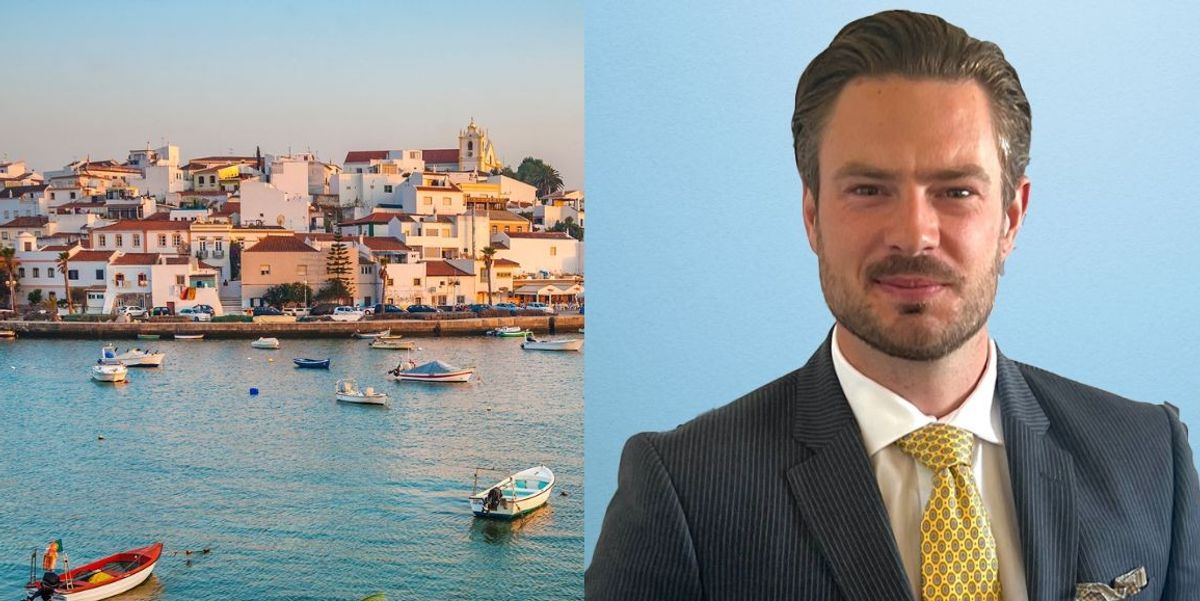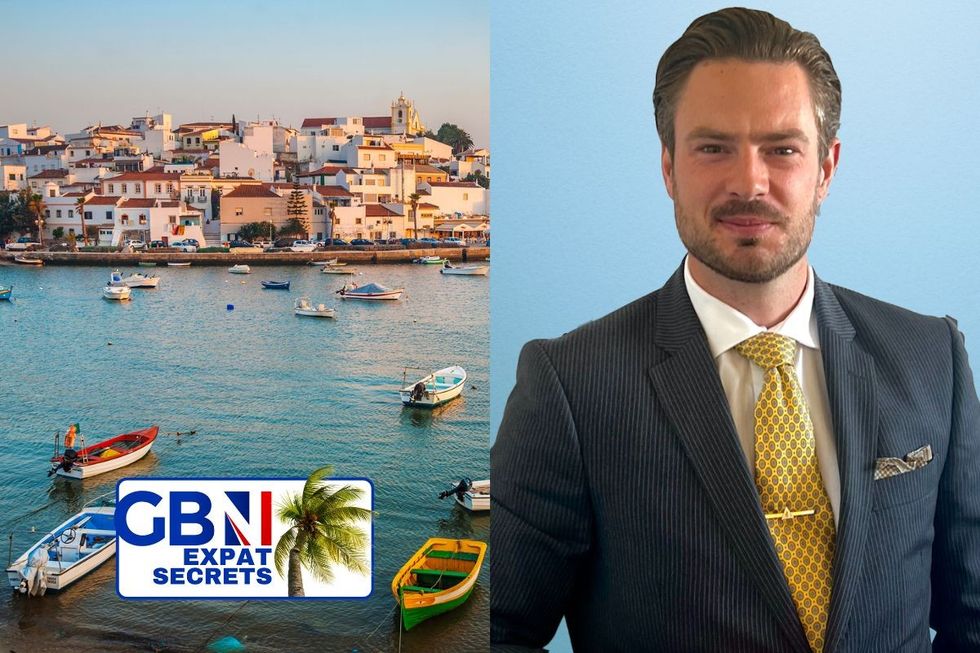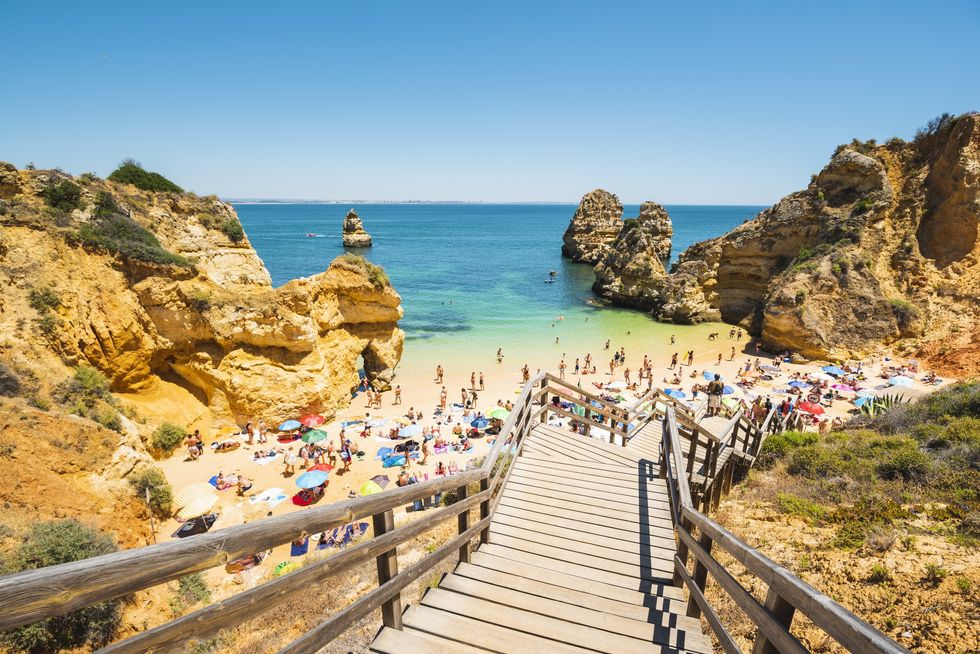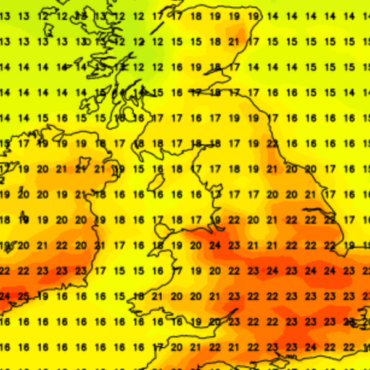George Hobson, 30, relocated to the Algarve, Portugal eight years ago and has never looked back.
The Yorkshireman spoke exclusively to GB News about his decision to move, Portugal’s perfect weather and why he can’t wait to raise his daughter in the European paradise.
“The story of how I moved here is actually quite funny,” the expat told GB News. “I used to visit the Algarve to visit my father who lived here for 15 years. I even spent an entire summer here to play rugby for an overseas team in Portugal.
“I made some fantastic friends and came over for one of their weddings eight years ago now and during the week-long wedding events, one of them asked me when I was actually going to come back to the Algarve full time.
“I’m someone who always has an answer, but it was the first time in my life I didn’t have a genuine answer. I couldn’t explain why I didn’t live in the Algarve full-time.

An expat in Portugal spoke to GB News about his new life
GETTY IMAGES / Auction House Algarve
“At the time I was self-employed in the UK. I was an independent consultant, so nothing was tying me to anywhere in particular. So in a lightbulb moment, I thought, ‘I’m watching you guys live this amazing life and have this great quality of life – why can’t I be a part of that?'”
So the day he returned home to North Yorkshire, George started packing his bags for a life in the Algarve and swiftly relocated just one week later.
While the expat was happy in his Harrogate home and described north Yorkshire as a “really beautiful place”, he told GB News: “I haven’t looked back since.”
A major difference between the Algarve and the UK is the weather. In north Yorkshire, George was used to a “very depressing” climate.
“And on top of that, everybody in the UK seems to be stuck in a rat race, which I was very much stuck in before I came here, and I needed a way of escaping it,” George admitted. “The moment I came here, I instantly relaxed into the Portuguese way of living, which is quite nice.
“The weather plays a big part of it, I’d say. We have around 300 to 310 days of sunshine a year, which is ludicrous. You’d be lucky to get a 10th of that in the UK.”
Consequently, life in Portugal is a “healthy” one. George owns Auction House Algarve and runs a secondary business where he invests and develops real estate, but when he’s not working, the expat is usually found playing sports.
George explained that maintaining a healthy lifestyle in the Algarve is easy, He said: “Coming here, I find that in the UK people want to be active and they want to be healthy, but there are too many social pressures that make it difficult.
“You really have to be motivated to live a healthy lifestyle in the UK, whereas here it’s almost inherent in how you go about your daily life. For instance, if you walk into a Portuguese supermarket here or any standard supermarket, you won’t find any ready meals or anything that’s microwavable – it’s all fresh produce.
“In the UK you walk into a petrol station and you’ve got ready meals jumping out at you and every sweet or chocolate you can think of. There’s too much temptation in the wrong direction in the UK, whereas, here, you don’t have any of that.”
George is also able to practice sports without having to “factor in” the weather. He said: “You always know you’re going to have blue skies or at least no rain for the vast majority of the year, so you can do anything you want.
“We have the beach down the road. You can surf and paddleboard. There are big communities of tennis. Paddle tennis now is a huge thing. Rugby football, just about everything you’d ever want essentially is on your doorstep.”
George admitted he is an “extroverted introvert”, and making friends doesn’t come totally naturally to him. However, the communities created around sports allowed the expat to form connections easily.
He said: “I sought out a rugby club straight away because that was my background, and the moment I walked in there I met two gentlemen that were from within three kilometres of my home town.
“These British expats became two of my closest friends out here, and now as a consequence, I’ve got a huge expat community of friends – and Portuguese friends as well, of course.”
For Britons who are thinking of making the move to Portugal, George reassured them: “You don’t have to be an athlete of any kind to take part in any of these groups.”
Making friends was also relatively easy for the expat because English is so widely spoken in Portugal, especially in the big cities and the Algarve.
George is still learning Portuguese slowly but surely. His partner is Portuguese and their 10-month-old daughter will grow up speaking both languages.
He said: “The vast majority of my clients and my friends all speak English, so I haven’t been forced to learn the language. And on top of that, the Portuguese are phenomenal linguists. Just about all of them speak English, but they often speak French and German as well because of the number of tourists that come from those countries.
“So you try and they appreciate you trying, but often it’s easier for them and for you, to just speak in English to each other. Language is certainly not a barrier, I would say. So if you’re considering moving to the Algarve or Portugal in general, I wouldn’t be concerned about the language one bit.”
Asked if there’s anything about life in Portugal that he doesn’t particularly like, “nothing stands out”.
He did give a word of warning for potential expats though. He said: “There are a few things that are completely different to the way of working in the UK. As a business owner, there were a lot of challenges for me. When I set up my first business here, it was very difficult. But you quite quickly learn the general gist of how things work and you have partners that you turn to.
“I have an accountant who helps me tremendously and guides me through the financials behind the business. I’ve also got a lawyer who helps me with everything legal-wise, paperwork, and insurance.
“The difficult thing about Portugal is that it is quite bureaucratic. We’re kind of 50, 70 years behind most European countries in many respects. So as a consequence, we are a little bit backwards in some cases, like how we do our paperwork.
“But for the most part, it’s there for a reason and it is easy to navigate. You just need somebody who’s done it before, and there are plenty of people there to help you with the different processes.”
Britons may need to develop some patience when dealing with Portugal’s bureaucracy though.
George said: “There are certain things in the UK that you take for granted. We may find it difficult to deal with entities like the DVLA or HMRC, but actually, we don’t realise just how advanced we are with a lot of those.”
Administration in Portugal is not quite as efficient, the expat suggested.
He said: “I lost the document for my car recently and I had to go down to the notary’s office and prove that I am the owner. I had to take my passport with me, and then I had to pay to have it re-delivered. And because it will only be re-delivered to the last known address, I had to then go to a different notary to change that last known address. So there are a few things that are a little bit more complicated than we would be used to, but it’s only because we haven’t got autonomous systems in place just yet.”
Asked about the cost of living in Portugal, George said: “It is possible to live on a shoestring budget here and live a very good quality of life.
“Even when you’re talking utility bills, we have a huge amount of solar energy here in Portugal, as you can imagine, so your cost of living from an energy perspective is much, much lower than in the UK.
“For the most part, it is considerably cheaper. If you’re earning in the UK and living here, you’ll live like a king or a queen.”
George can’t speak highly enough of Portugal and would recommend anyone to move there. For those considering swapping the UK for the Algarve, he advised: “If you’re looking to invest in a home and relocate here, take your time in doing that. You’ll have a lot of pressure from real estate agents to try and buy something as soon as you get here, and they’re obviously driven by commissions. So I’d suggest taking your time.
“The Algarve is around 180km long, and there are various different environments across it. You can have nightlife, you can have a slow pace of life, you can have hills, you can have flatlands. You can be close to the islands, or you can be on the cliffs if you really want to. There are various different styles of living that you can find, so take your time.”
The expat advised renting before buying to get a real feel for your chosen area, aiming for six to 12 months.
LATEST DEVELOPMENTS

‘The Algarve is second to none – there’s nowhere else I’d rather be’
GETTY IMAGES
The expat added: “And make sure you have partners in place. There are lots of bureaucratic elements that you need to consider, and if you have the right advisors and the right lawyers that can help you through those processes, it shouldn’t be difficult.”
As for how to find the right professionals, George recommended having a look on Facebook.
George has been offered opportunities all over the world in his line of work, but Portugal feels like home to him.
He said: “There are lots of places I enjoy going to, but I would never live anywhere else. Friends and family often ask me, ‘When are you actually going to come home?’. But I am home, as far as I’m concerned. The Algarve will always be home now.
“And I’m lucky that my daughter is going to grow up in an environment where that’s all she knows, at least the first 18 years of her life. I’m a little bit jealous, I wish I could have had that as a kid, but I’m pleased at the same time.”
While George is very far off retirement age himself, he believes it would be a wonderful country to spend his later years.
“I think it’s got to be up there as one of the best places to retire,” said George. “But when you’re looking at retirement and you’re getting that little bit older, you start to look at things in a little bit more detail.
“I think one of the things you look for is safety and security. Then secondarily you’ll look for support mechanisms, whether it be hospitals in close proximity or infrastructure around you that can help you.
“We have a fantastic healthcare system here. Depending on your visa structure it works similarly to the NHS – it’s freely available. Even with private healthcare, for those expats who can afford to live overseas, it’s phenomenally cheap.
“There are very, very minimal waiting times, even for major procedures. I can tell you, I’ve been through far too many hospitals with injuries from rugby.
“On top of that, there’s a famous phrase that we adopt here in Portugal – it’s similar to Spain’s mañana but it’s called amanhãwhich is essentially tomorrow. Anyone who is getting to 50 or 60 years old and has spent their life working quite hard, chipping away to have the pot of gold that allows them to move to another country, Portugal will fit perfectly with them.
“I’m assuming if they’re moving to somewhere like Portugal, they want to take a step back. They want to relax a little bit and have a much slower pace of life. Even those working in a professional environment here adopt that ethos. There is no living to work, it’s very much working to live.
“And they take their downtime, their relaxation time and their personal time very, very seriously. Everything’s very family-orientated and I think that suits most people’s ethos when they’re looking to retire and they want to slow down.
“They’ve had a fast-paced life most of their life, and it’s time to relax a little bit.”
Asked where retirees should seek out in the sleepy paradise, George said: “I think that Portugal is a great place in general. But the Algarve in particular is second to none. There’s nowhere else I’d rather be.”
Moving to Portugal
What you need to know
Portugal is a beautiful choice for expats and is popular among Britons looking to relocate. For those considering the move, it’s important to be aware of a few things regarding visa and residency information, how to find accommodation and driving in Portugal.
The Foreign, Commonwealth and Development Office has provided essential guidance for Britons considering the move.
On GOV.UK, the Government office said: “You must tell the UK government offices that deal with your benefits, pension and tax if you are moving or retiring abroad.”
Britons must check the entry requirements for Portugal. They must read the Portuguese government’s general entry requirements for Portugal, information about visas on the Portuguese Ministry of Foreign Affairs Page, and the Portuguese Immigration Authority’s website for information on residence, working and studying in Portugal (in Portuguese).
Get Golden Visa provides a definitive guide on Portugal’s Golden Visa in 2024, including eligibility and requirements.
The Government also has detailed guidance on buying property abroad. Britons were warned: “If you’re considering buying a property overseas you’ll need to bear in mind that the legal system and steps to follow may be very different from those you have experienced in the UK.”
The FCDO offered some key points Britons should be aware of when purchasing property in Portugal.
The Government said: “If you are buying property in Portugal, consider taking advice from a lawyer who is experienced in land law and property transactions. Make sure that they are registered with the law society, Ordem dos Advogados (in Portuguese).
“Some notaries, who are trained lawyers in Portugal, offer an independent property purchasing service known as Casa Simples, Casa Segura (in Portuguese).
“If you are thinking of buying a coastal, river or lakeside property, ensure it’s not affected by the 2005 water resources law (in Portuguese).
“If you buy rural property, make sure you comply with the law on preventing forest fires.”
A recent agreement means that driving in Portugal is very straightforward for Britons. The FDCO explained: “A new bilateral agreement between the UK and Portugal on the mutual recognition and exchange of driving licences entered into force on December 31, 2023.
“This means that if you are a resident in Portugal and hold a full and valid driving licence issued in the UK or Gibraltar, you can drive in Portugal on your current licence until it expires, provided you have registered your licence with IMT, or exchange your licence for a Portuguese one without needing to take a test (see exception below).”
Best places for retirees
- The Silver Coast
- The Algarve
- Lisbon
- Porto
- Madeira
- Coimbra
Why Britons choose to live in Portugal
- Warm climate
- Affordable (depending on where you decide to live)
- Safe
- Incredible landscapes
- Excellent healthcare
- English is widely spoken (although more so in major cities than in smaller towns)
- Slower pace of life – may suit expats who have relocated for their retirement
- Sociable and fun – perfect for those who love a party
- Community is important
Possible pitfalls
- Language barrier (officials in government offices will likely not speak English)
- Some places operate on a cash-only basis so you will need to remember to carry change
- Bureaucracy can be laborious
- Slower pace of life means that things may not get done as quickly as you might like
- Homes can get cold at night as many do not come with a radiator – you may need to purchase your own heater













Post comments (0)